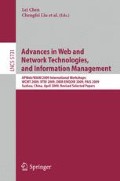Abstract
This paper proposes a dynamic alert degree evaluation model (named ADEB) for blogosphere to improve the poor tracking ability of topic spreading in traditional topic detection models. The model comprehensively considers the mutual influence of the alert text and the spreading speed, and dynamically modifies the evaluation results by analyzing the alert topic occurring frequency, reviews, comments and existing time of the blog topic. Through tracking the alert blog topic generation and spreading, ADEB effectively avoids the inaccuracy of the static alert limit threshold, shortens the alert response time and improves the detection ability of the burst alert. To validate the performance of ADEB, the experiments on the data corpus about “Campus Network Culture” demonstrate that ADEB has higher application validity and practicality of alert evaluation for blogosphere.
Access this chapter
Tax calculation will be finalised at checkout
Purchases are for personal use only
Preview
Unable to display preview. Download preview PDF.
References
Blog (2008), http://en.wikipedia.org/wiki/Blog
Yu-Hang, Y., Tie-Jun, Z., Hao, Y., De-Quan, Z.: Research on Blog. Journal of Software 19(4), 912–924 (2008)
Seo, Y.W., Sycara, K.: Text Clustering for Topic Detection, Carnegie Mellon University, the Robotics Institute (2004)
Fiscus, J., Doddington, G.: Topic detection and tracking evaluation overview. In: Allan, pp. 17–31 (2002b)
Rebedea, T., Trausan-Matu, S.: Autonomous news clustering and classification for an intelligent web portal. In: An, A., Matwin, S., Raś, Z.W., Ślęzak, D. (eds.) Foundations of Intelligent Systems. LNCS, vol. 4994, pp. 477–486. Springer, Heidelberg (2008)
Kathleen, R.M., Barzilay, R.B.: Tracking and Summarizing News on a Daily Basis with Columbia’s Newblaster. In: Proceedings of the Human Language Technology Conference,Vancouver, pp. 162–168 (2002)
Makkonen, J., Ahonen-Myka, H., Salmenkivi, M.: Topic Detection and Tracking with Spatio-temporal Evidence. In: Proceedings of the 25th European Conference on Information Retrieval Research, pp. 251–265 (2003)
Radev, D., Otterbacher, J., Winkel, A.: Newsinessence: Summarizing ONine News Topics. Communications of the ACM 48(2), 95–98 (2005)
Manquan, Y., Weihua, L., et al.: Research on Hierarchical Topic Detection in Topic Detection and Tracking. Journal of Computer Research and Development 43(3), 489–495 (2006)
Zi-Yan, J., Qing, H., Hai-Jun, Z., et al.: A News Event Detection and Tracking Algorithm Based on Dynamic Evolution Model. Journal of Computer Research and Development 41(7), 1273–1280 (2004)
Lam, M.I., Gong, Z., Muyeba, M.K.: A method for web information extraction. In: Zhang, Y., Yu, G., Bertino, E., Xu, G. (eds.) APWeb 2008. LNCS, vol. 4976, pp. 383–394. Springer, Heidelberg (2008)
Liu, W., Shen, D., Nie, T.: An effective method supporting data extraction and schema recognition on deep web. In: Zhang, Y., Yu, G., Bertino, E., Xu, G. (eds.) APWeb 2008. LNCS, vol. 4976, pp. 419–431. Springer, Heidelberg (2008)
Mei, Q., Cai, D., Zhang, D., Zhai, C.: Topic Modeling with Network Regularization. In: WWW 2008, Beijing, China, April 21–25 (2008)
Boley, H., Kifer, M. (eds.): RIF Core Design (2007), http://www.w3.org/TR/rif-core/
Xiang, M., Junliang, C., Xiangwu, M., Meng, X.: An information retrieval method based on knowledge reasoning. In: Chang, K.C.-C., Wang, W., Chen, L., Ellis, C.A., Hsu, C.-H., Tsoi, A.C., Wang, H. (eds.) APWeb/WAIM 2007. LNCS, vol. 4537, pp. 328–339. Springer, Heidelberg (2007)
Bag of words model (2008), http://en.wikipedia.org/wiki/Bag_of_words_model
Author information
Authors and Affiliations
Editor information
Editors and Affiliations
Rights and permissions
Copyright information
© 2009 Springer-Verlag Berlin Heidelberg
About this paper
Cite this paper
Weng, Y., Hu, C., Zhang, X. (2009). ADEB: A Dynamic Alert Degree Evaluation Model for Blogosphere. In: Chen, L., et al. Advances in Web and Network Technologies, and Information Management. APWeb WAIM 2009 2009. Lecture Notes in Computer Science, vol 5731. Springer, Berlin, Heidelberg. https://doi.org/10.1007/978-3-642-03996-6_8
Download citation
DOI: https://doi.org/10.1007/978-3-642-03996-6_8
Publisher Name: Springer, Berlin, Heidelberg
Print ISBN: 978-3-642-03995-9
Online ISBN: 978-3-642-03996-6
eBook Packages: Computer ScienceComputer Science (R0)

